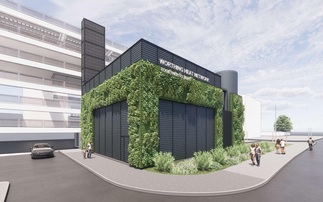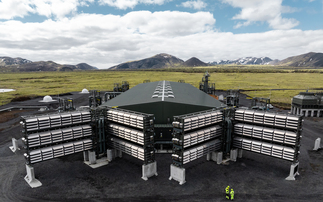Shorter-term corporate PPAs offering contract terms of as little as three to five years are becoming increasingly common, explains ENGIE's Russell Reading
Renewable energy is in demand like never before. Businesses of all sizes are prioritising carbon reduction and environmental responsibility, driven both by government targets and by demand from customers for more sustainable products and services. In a recent survey of businesses by ENGIE, more than three quarters (79 per cent) indicated that energy usage is the major contributor to carbon emissions in their organisations - which means decarbonising energy supplies must be the top priority for any net zero or carbon-reduction programme.
Growing demand for carbon-free energy
In the past six years, we've seen a huge increase in the number of businesses looking at green electricity contracts, from a base of almost no interest outside of a few major corporations, to a situation where most businesses have renewable energy on their minds.
Even now, the renewable energy supply market is quite polarised. At one end of the scale are simple green electricity supply contracts backed by Renewable Energy Guarantees of Origin (REGOs), which appeal to businesses who need simplicity and cannot make the long-term financial commitments needed to secure Corporate Power Purchase Agreements (CPPAs). CPPAs, at the other end of the scale, enable those relatively few larger organisations that can commit to long-term fixed-price supply agreements with new renewable power plants, to access fixed price guaranteed green energy supplies from a designated source for their business over the next 15 years. In return they give the payment guarantees required to get new renewable projects off the ground.
New green energy purchasing options
The good news is, the renewable energy supply market is beginning to evolve, creating more options for businesses of all sizes to source their electricity from renewable generators.
More options on how to set up and operate long term corporate power purchase agreements (CPPAs) are evolving, but most significantly, shorter-term corporate PPAs have been developed to appeal to a much wider market, with contract terms of as little as three to five years. This type of corporate PPA still involves a direct supply from a renewable generator, but the business signing the contract does not have to be the sole off-taker from that asset and the CPPA is much more integrated into the supply agreement making it much easier, and crucially efficient, to set up and run.
Familiarity breeds trust
Whereas the traditional CPPA was typically a long-term fixed price (with indexation) agreement, the new breed of CPPAs are much more like a conventional energy supply contract. They can incorporate fixed prices or flexible market price deals, enabling businesses to choose between price stability or access to more market-reflective rates.
These new CPPAs are integrated into more familiar energy supply agreements, so a business may opt for a five-year CPPA with a solar power generator, and then secure the rest of their energy via a green energy supply contract with options available to ensure they can still know the source of their green energy. The new short-term CPPAs offer a really simple, low-risk way for businesses to access renewable energy generation because the CPPA is provided by an energy supplier that has an established long-term PPA with the generator. This type of agreement eliminates the need for complex balancing or sleeving agreements and legal contracts.
Short-term arrangements enable businesses to dip their toe into the world of CPPAs or even make the transition to more traditional CPPAs. The difference between a corporate PPA and a standard green energy supply contract is that it enables a business to know before the contract starts precisely which generator its renewable electricity will be coming from, and access fixed prices for this in advance.
Add on-site generation to the mix
The new corporate PPAs add to the carbon-free energy options available to businesses. Of course, one of the most direct ways to source renewable electricity is to install green generation assets on your own site. For those businesses that have the space available, supplying your own premises directly has many benefits, such as avoiding a number of import and other costs. However, many businesses are unlikely to have enough room on site to install sufficient renewable generation assets to meet all of their energy requirements.
In this situation, businesses can mix and match different renewable energy supply strategies. So, a proportion of requirements could be met by on-site solar panels or wind turbines, and the rest made up with a green electricity supply contract or corporate PPA.
The quest for additionality
The holy grail of renewable energy purchasing is additionality - supporting the development of new renewable generation assets that displace fossil-fuel-based generation. The original long-term corporate PPAs enabled large corporate organisations to do just that, by providing the payment assurances developers needed to build new plants. These 15-year PPAs remain instrumental in enabling new renewable assets to be added to the UK generation mix.
The new short-term corporate PPAs are most likely to be agreed with renewable generation plants that are already in operation. However, the hope is that as businesses become more familiar with CPPAs, their confidence will grow, and they may consider longer-term agreements that achieve additionality by supporting new asset development. As the market for shorter term CPPAs grows, this could also leverage new build assets as confidence on the developer and funder side grows.
Building towards a carbon-free future
The government's ten-point plan for a green industrial revolution, the Energy White Paper and the forthcoming UN Climate Change Conference (COP26) in Glasgow, will ensure that carbon reduction remains front-of-mind for all businesses. The challenge for energy suppliers and generators is to continue developing renewable energy products and services that work for all types of business. This will ensure we meet the growing demand for renewable energy, continue to increase the proportion of renewables in the UK fuel mix, and help to build towards a carbon-free future.
Russell Reading is renewables operations director at ENGIE.
For further information on ENGIE, visit www.engie.co.uk







